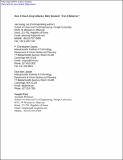Does urban living influence baby boomers’ travel behavior?
Author(s)
Lee, Jae Seung; Park, Sungjin; Zegras, Pericles C; Ben-Joseph, Eran
DownloadLee et al_JTG_final.pdf (549.6Kb)
PUBLISHER_CC
Publisher with Creative Commons License
Creative Commons Attribution
Terms of use
Metadata
Show full item recordAbstract
We compare the travel behavior of urban versus suburban baby boomers in the Boston metropolitan area. Using propensity score matching to attempt to control for self-selection and data from two surveys implemented in 2008 and 2010, we find that the urban boomers tend to be less automobile-dependent than suburban baby boomers. Urban baby boomers also make more recreational non-motorized transport (NMT), social, utilitarian, and transit commute trips. Most of these differences seem to be primarily a result of the urban setting, not the particular preferences of boomers living in urban settings. We find very small self-selection effects on automobile commuting, recreational NMT, and utilitarian trips: 1–7% of observed influence. We also find some evidence that baby boomers’ preference for social activities tends to be mismatched to their environments – suburban boomers want more social opportunities than their settings enable. For public transport, we find a relatively large self-selection effect, 43% of observed influence, suggesting a transit-oriented boomer market segment exists.
Date issued
2014-02Department
Massachusetts Institute of Technology. Department of Urban Studies and PlanningJournal
Journal of Transport Geography
Publisher
Elsevier
Citation
Lee, Jae Seung et al. “Does Urban Living Influence Baby Boomers’ Travel Behavior?” Journal of Transport Geography 35 (2014): 21–29.
Version: Author's final manuscript
ISSN
0966-6923